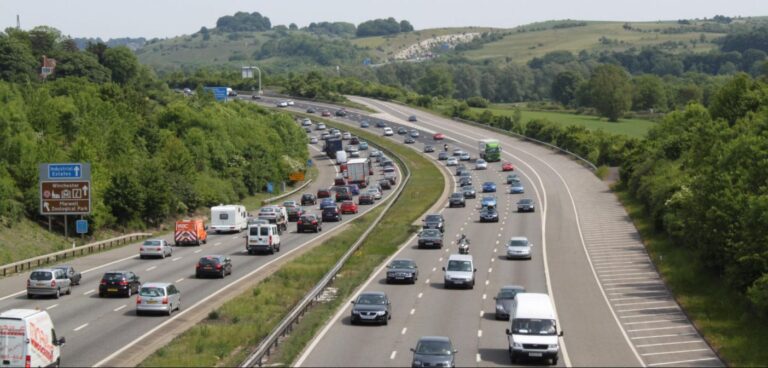With the number of vehicles on UK roads forecasted to increase as we transition to EVs, congestion is only going to get worse unless decisive action is taken, writes Andy Cliffe, CEO of M6toll, who explores how road user charging can be used to holistically address this major drain on the country’s economic productivity and our quality of life…
How to decarbonise the transport network while also maintaining growth and quality of life is going to be one of the main political debates of this decade. But when it comes to road transportation there is one thing that we can all agree on: congestion is bad and there is far too much of it.
Congestion is not just a mere annoyance (although it is easier to say that when you’re not running late for a meeting or trying to make it home to see your children before bedtime). It’s also a major economic drain on the UK’s productivity and our quality of life.
Research by INRIX shows that drivers in the UK spend an average of 115 hours per year sat in congestion, while the Tony Blair Institute recently also found that congestion costs the economy £60bn a year. That’s £900 for every person in the country.
The region in which the M6toll is based has it particularly bad. INRIX has ranked Birmingham as the seventh most congested urban area, with an average of 80 hours per driver lost due to congestion, costing the local economy an estimated £325m per year. The M6, running through the region, is the busiest motorway in the country.
As the operator of the M6toll, I’m proud that we are moving up to 85% of longer distance-traffic off the M6 corridor, freeing up capacity for local journeys, and offering drivers an average journey time saving of 41%.
But while the knock-on benefits of the M6toll can be felt nationwide, more needs to be done to tackle congestion – and government really needs to act decisively now to make sure that congestion doesn’t harm the long-term viability of the UK’s strategic roads network. Indeed, the big worry facing industry is that unless action is taken now, congestion is only going to get worse.
The electric vehicle transition
One of the main attractions of electric vehicles (EVs) is that in addition to being good for the environment, they are also much cheaper to run. The cost of fuel duty and vehicle excise duty for an average petrol or diesel car is approximately £1,100 a year, while for EVs it is as low as £320. This is to be celebrated as lower running costs will encourage more drivers to, rightly, switch to an EV.
However, lower day-to-day running costs will also encourage drivers to use their cars more often, further heightening congestion across the network. Indeed, the UK Department for Transport has forecast that the transition to EVs will result in an increase in traffic by 30%, while the proportion of kilometres driven in congested conditions is forecast to rise by 5 percentage points to 12%.
Congestion is therefore a ticking time bomb. We think that we have it bad at the moment, but if we fail to act then the problem will only get worse – at which point, it will be too late to address.
Delivering fairness
There is no escaping the fact that congestion affects everybody, regardless of whether you are driving a petrol or diesel car or a new EV. The problem is that it doesn’t affect people equally and, if congestion is only going to get worse, this inequality is only going to widen.
While the monetary cost of driving is pretty much the same across the day and the country, the societal cost can be hugely varied. Choosing to drive on already congested London A-roads, for instance, has a much greater impact in terms of air pollution and contribution to congestion than driving on a quieter rural B-road. And choosing to drive during the weekday rush hour if you could travel later has a greater impact on your fellow motorists than travelling when there is less competition for the network.
As the government examines solutions to congestion, it would be right to also think innovatively about how to encourage behaviour change to drive at times when there are fewer vehicles on the network. This would ultimately reduce congestion in a way that would benefit both motorists and the wider environment.
Addressing the roads ‘trilemma’
Congestion is merely one part of the ‘trilemma’ of policy challenges facing the government over the strategic roads network. Combined with the need to drive forward decarbonisation, while addressing the looming funding gap facing Her Majesty’s Treasury, as we transition to a fully EV system, these challenges can often feel contradictory and impossible to address in a holistic manner.
As I have written elsewhere, a system of road user pricing may be part of the answer not just to congestion but also to the wider roads trilemma. While the exact mechanics of any system still need to be determined, road user pricing could incentivise drivers to change patterns of behaviour, while a more dynamic system could promote alternative routes or similar possibilities to ensure the wider network keeps Britain moving.
What is clear is that, as with so many challenges facing transportation policy, doing nothing isn’t an option – and now is the time for decisive action to ensure our strategic roads network remains fit for the future.





